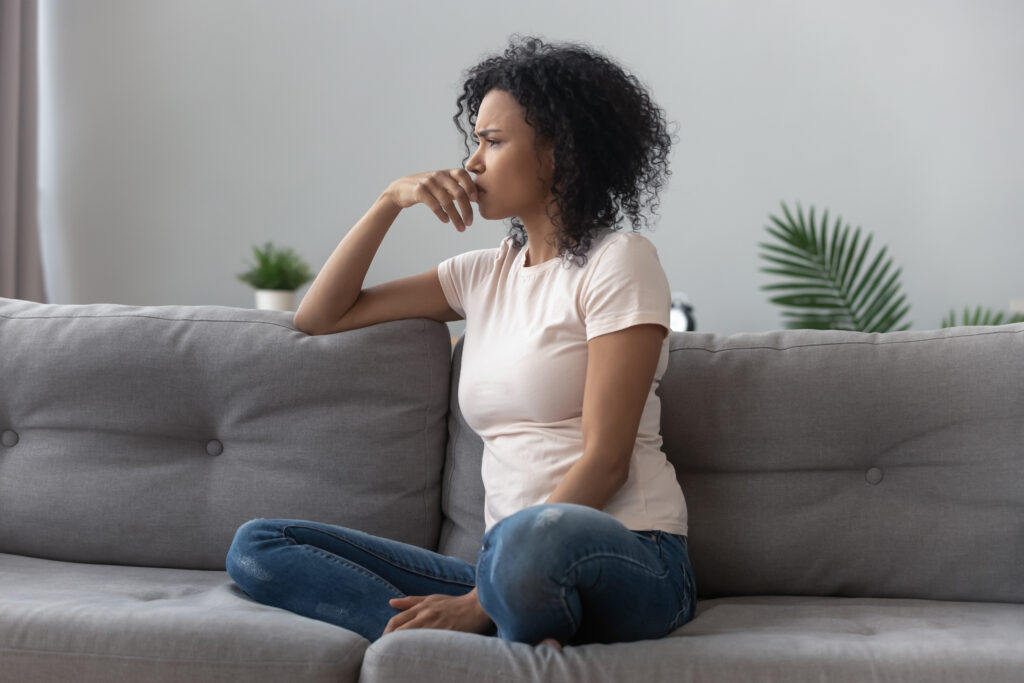It’s normal to feel anxiety or nervousness amid changes or during a high-pressure situation, such as giving a performance or public speaking. However, if you feel anxiety often and avoid certain situations, events, or people because of it, you may have an anxiety disorder.
What started as a mild anxiety disorder can become crippling anxiety if untreated. We’ll thoroughly discuss what debilitating anxiety is, how it progresses from untreated anxiety, and what you can do to treat your crippling anxiety.
We’ll cover—
- How severe anxiety disorders affect people’s physical and mental health
- Symptoms of severe anxiety disorders
- The genetic and environmental factors that cause overwhelming anxiety
- Treatments for crippling anxiety
If you suspect you have anxiety and want fast, convenient, affordable anxiety relief, seek treatment through Klarity today. We’ll connect you with a healthcare provider online who can assess your symptoms and provide treatment if necessary, bypassing the need for in-person doctor’s visits and time off work.
Get started by taking a free 2-minute self-evaluation.
How Can Debilitating Anxiety Affect Your Life?
Debilitating anxiety can have a significant impact on various aspects of a person’s life, including mental, emotional, physical, and social well-being. Some of the ways debilitating anxiety may affect one’s life include:
- Personal relationships: Crippling anxiety can strain relationships with family, friends, and romantic partners, as it may cause excessive worry, irritability, or emotional withdrawal. People with debilitating anxiety may also avoid social situations, leading to isolation and feelings of loneliness.
- Work or school performance: Debilitating anxiety can make it difficult to concentrate, meet deadlines, or effectively communicate with colleagues or classmates. This can result in decreased productivity, poor academic performance, or even job loss.
- Physical health: Chronic anxiety is linked to several physical health problems, including headaches, gastrointestinal issues, muscle tension, and a weakened immune system. It can also contribute to or exacerbate pre-existing health conditions.
- Mental health: Debilitating anxiety can increase the risk of developing other mental health disorders, such as depression or substance use disorders, as individuals may try to self-medicate or cope with their anxiety in unhealthy ways.
- Daily functioning: Severe anxiety can make routine tasks, like grocery shopping or driving, feel overwhelming or even impossible. This can lead to a reduced quality of life and a sense of helplessness or hopelessness.
- Sleep disturbances: Crippling anxiety often causes sleep problems, such as difficulty falling or staying asleep, frequent waking during the night, or experiencing nightmares. Poor sleep quality can further exacerbate anxiety and negatively impact overall well-being.
- Avoidance behaviors: People with crippling anxiety may avoid situations or activities that trigger their anxiety symptoms, which can limit their experiences and opportunities for personal growth and fulfillment.
Ready for the next step in your mental health journey? Book an appointment with a licensed provider on Klarity today.
Types of Anxiety Disorders
There are several types of anxiety disorders, and each one has the potential to become crippling anxiety. Some of the most common types include:
- Generalized Anxiety Disorder (GAD): GAD is characterized by chronic and excessive worry about various aspects of life, such as work, health, finances, or relationships. People with GAD often find it difficult to control their anxiety, even when there is no apparent reason for concern.
- Panic Disorder: Panic disorder involves recurrent and unexpected panic attacks, which are sudden episodes of intense fear accompanied by physical symptoms such as heart palpitations, shortness of breath, dizziness, or nausea. People with panic disorder may develop anxiety around having additional attacks, leading to avoidance behaviors and changes in daily routines.
- Social Anxiety (Social Phobia): Social Phobia is characterized by a persistent fear of social situations and being judged or negatively evaluated by others. This can lead to avoidance of social events or public speaking engagements, causing significant distress and interference with daily life.
- Specific Phobias: A specific phobia is an intense, irrational fear of a specific object or situation, such as heights, spiders, or flying. People with specific phobias may go to great lengths to avoid encountering the feared object or situation, which can significantly impact their daily functioning.
- Agoraphobia: Agoraphobia involves a fear of being in situations where escape might be difficult, or help might not be available if panic occurs. This can lead to avoidance of various situations, such as crowded places, public transportation, or even leaving the house.
- Separation Anxiety: Separation anxiety is characterized by excessive fear or worry about being separated from attachment figures, such as parents or caregivers. While it is more common in children, adults can also experience separation anxiety. Examples of this are seperation anxiety from a spouse or close friend.
Symptoms of Debilitating Anxiety
Clinical anxiety manifests in the mind, which regulates how you experience the world. When the mind senses a potential threat, it can cause physical, emotional, and behavioral reactions meant to protect us. However, anxiety often skews your perspective, causing threat responses even when you’re safe.
Below is a list of common anxiety symptoms. If you’ve experienced any of these symptoms for two weeks or longer, it may be beneficial to seek the advice of a mental health professional for help treating anxiety.
Emotional symptoms may include:
- Excessive worry or fear that is difficult to control and persists for an extended period.
- Feelings of impending doom or constant uneasiness.
- Irritability and mood swings.
- Difficulty concentrating or focusing on tasks.
- Restlessness or a constant feeling of being on edge.
- Intrusive thoughts or persistent, unwanted thoughts that cause distress.
Physical symptoms may include:
- Rapid or irregular heartbeat.
- Shortness of breath or hyperventilation.
- Chest pain or tightness.
- Sweating or hot flashes.
- Trembling or shaking.
- Dizziness or lightheadedness.
- Nausea or gastrointestinal issues.
- Muscle tension or aches and pains.
- Fatigue or exhaustion.
- Sleep disturbances, such as insomnia, restless sleep, or nightmares.
Behavioral symptoms may include:
- Avoidance of situations, places, or activities that trigger anxiety, which can lead to social isolation or missed opportunities.
- Procrastination or difficulty making decisions.
- Seeking constant reassurance from others or engaging in excessive checking behaviors.
- Withdrawal from social interactions or activities that were once enjoyable.
- Substance use or other unhealthy coping mechanisms to manage anxiety.
- Excessive control or perfectionism in an attempt to minimize feelings of uncertainty or insecurity.
What Causes Debilitating Anxiety?
Anxiety disorders—such as panic disorder—can come from a variety of sources. Anxiety can be hereditary, being passed from parent to child. It can also arise from external factors that are very stressful or traumatic.
Regardless of the source, debilitating anxiety is usually treated the same way—with a combination of psychotherapy and medication. However, knowing where your anxiety comes from can help determine what kind of therapy or prescription may work best for you.
Genetic Factors
Just like any other health condition, anxiety can run in families. It may skip a generation or only affect two siblings out of three, but the fact remains—if your parent or grandparent has anxiety, you’re more likely to have it, too.
Further, certain personality types and neurotypes are more prone to developing anxiety. For instance, introverted individuals need time to reset and recharge after socializing. Being unable to do so could lead to acute or chronic anxiety.
Environmental Factors
The human brain is very malleable because it creates neural pathways based on new information. While this function is essential for learning and problem-solving, it can lead to anxiety if the same stressful or traumatic pattern is retraced too often.
For instance, a person who was bullied frequently in school may develop anxiety around social interaction. This pattern could cause them to perceive a relatively safe environment—such as their workplace—as dangerous because their brain is prepping for self-defense.
How Can I Tell If My Anxiety Is Debilitating?
Debilitating anxiety happens when your anxiety becomes so intense and overwhelming that it affects most aspects of your daily life. You may isolate yourself to avoid potentially uncomfortable situations, endure constant tension, be unable to sleep, or have frequent panic episodes.
Crippling anxiety is not only exhausting and uncomfortable, but it can also keep you from having new experiences or doing the things you enjoy. If you suspect you have crippling anxiety, it’s best to seek professional medical assistance. Treatment can help you gain control of your anxiety and reclaim your peace.
Seek A Professional Diagnosis
Getting an official diagnosis from a qualified healthcare provider is the first step to anxiety treatment. A diagnosis can help you access counseling, prescription medication, and other therapies to help alleviate your symptoms and make managing your condition easier.
To get a professional diagnosis, you can schedule an online appointment with a healthcare provider on Klarity. Every provider is fully licensed and qualified to evaluate your symptoms and provide a professional diagnosis.
Treatment for Debilitating Anxiety
Treatments for crippling anxiety come in several forms, including:
- Counseling or therapy
- Lifestyle changes
- Prescription medicine
Since anxiety can come from various sources, most healthcare providers treat it comprehensively with a combination of these therapies.
Medications
Prescription anti-anxiety medicine is especially useful for managing your anxiety. It helps alleviate symptoms quickly so you can focus on developing healthy coping skills for long-term anxiety management.
When taking medication for anxiety, it’s important to disclose all medications, supplements, and medical conditions to your healthcare provider. Having more information will help them choose the right medication for you.
There are a number of anti-anxiety medications available via prescription. Most of them fall under the category of SSRI or SNRI, as detailed below.
SSRIs
Serotonin is a neurotransmitter that helps regulate mood, along with a number of other bodily functions. Selective serotonin reuptake inhibitors (SSRIs) are a class of medications that help alleviate anxiety by increasing serotonin levels in the brain. Taking an SSRI prevents your neurons from absorbing serotonin, so more of it is available in the brain. This process helps alleviate the symptoms of anxiety.
A few common SSRI medications include Prozac, Zoloft, Lexapro, and Paxil.
SNRIs
Like SSRIs, serotonin and norepinephrine reuptake inhibitors (SNRIs) ease anxiety by affecting certain neurotransmitters in the brain—namely, serotonin and norepinephrine. Just as serotonin regulates moods, norepinephrine plays a role in regulating wake-sleep cycles and nervous system responses. Too little norepinephrine can disrupt these systems and contribute to the onset of anxiety.
SNRI medications increase both serotonin and norepinephrine levels in the brain by preventing your neurons from absorbing them. Common SNRIs include Cymbalta, Pristiq, and Effexor XR.
Get Diagnosis and Treatment From A Licensed Healthcare Provider on Klarity!
When it comes to debilitating, crippling anxiety, the last thing you need is to jump through hoops to get treatment. At Klarity, we remove obstacles like travel times and insurance coverage so you can get the help you need on your own terms and from your own homeTake a free self-evaluation, and speak with a board-certified healthcare provider in 48 hours or less—no insurance necessary.
Sources:
“Serotonin and Norepinephrine Reuptake Inhibitors (SNRIs).” Mayo Clinic.
https://www.mayoclinic.org/diseases-conditions/depression/in-depth/antidepressants/art-20044970
“Selective Serotonin Reuptake Inhibitors (SSRIs).” Mayo Clinic.
https://www.mayoclinic.org/diseases-conditions/depression/in-depth/ssris/art-20044825
“What to Do When Your Anxiety Becomes Debilitating.” EXIS Recovery, Inc.
https://www.exisrecovery.com/blog/what-to-do-when-your-anxiety-becomes-debilitating
“What Is Debilitating Anxiety? How to Seek Help for Crippling Anxiety.” Georgetown Behavioral Hospital. https://www.gbhoh.com/what-is-debilitating-anxiety-how-to-seek-help-for-crippling-anxiety/







